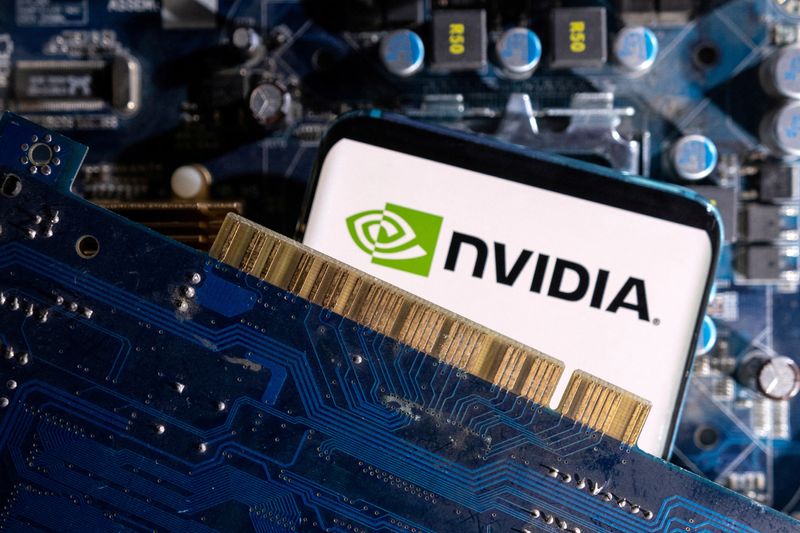On Tuesday, KeyBanc Capital Markets revised its outlook on shares of several semiconductor companies based on its quarterly supply chain findings. The review led to a more negative stance on NVIDIA Corporation (NASDAQ:NVDA) and Advanced Micro Devices, Inc. (NASDAQ:AMD), with both companies' estimates and price targets being adjusted downward.
According to InvestingPro data, NVIDIA maintains a perfect Piotroski Score of 9, indicating exceptional financial strength, with impressive revenue growth of 152% in the last twelve months.
For NVIDIA, KeyBanc pointed to several factors contributing to the negative outlook. The demand for NVIDIA's Hopper GPUs is expected to decline double digits quarter-over-quarter in the fourth quarter of 2024, contrary to previous expectations of growth.
Moreover, the contribution from Blackwell GPUs is anticipated to be lower than expected due to poor manufacturing yields and supply constraints affecting the GB200 NVL server racks. These issues have led to a reduction in fiscal year 2026 revenue projections for NVIDIA's data center compute segment from $200 billion to $185 billion.
Despite these near-term challenges, KeyBanc maintains an Overweight rating on NVIDIA, viewing the issues as temporary. InvestingPro analysis shows NVIDIA currently appears overvalued compared to its Fair Value, though the company maintains robust fundamentals with a 75.86% gross profit margin and strong cash flows that adequately cover interest payments.
AMD's outlook has also been affected, with KeyBanc lowering its estimates and price target for the company. Specific details regarding the revised price target were not provided in the context.
The semiconductor sector findings were mixed overall. While demand for AI remains strong, there are crosscurrents in GPUs and AI ASICs. China is showing signs of recovery in the automotive and smartphone markets, with the latter experiencing an uptick due to handset subsidies. Conversely, demand in the U.S. and Europe remains weak, with expectations for the auto and industrial markets to bottom in the first half of 2025.
KeyBanc also noted mixed implications for Marvell Technology Group Ltd . (NASDAQ:MRVL) and Monolithic Power (NASDAQ:MPWR) Systems, Inc. (NASDAQ:MPWR). Marvell's positives include winning the Trainium Ultra (V2.5) contract, which should help bridge revenue gaps, while negatives include losing Trainium 3 to a competitor.
For Monolithic Power Systems, the analysis revealed that while the company has been successfully qualified on Blackwell, it is currently out of the B200/GB200 market and is more likely to regain share on the B300 variant.
The report concluded with a broader industry perspective, indicating that broad-based demand trends remain weak, with China as the only bright spot. Channel inventories are largely normalized, but there are still pockets of excess inventories at end customers.
The expectation is that the semiconductor market is getting closer to reaching a bottom, providing a glimmer of optimism amidst the prevailing weakness. For deeper insights into the semiconductor sector and comprehensive analysis of over 1,400 US stocks, including detailed Fair Value calculations and financial health scores, consider accessing InvestingPro's exclusive research reports and tools.
In other recent news, NVIDIA, the semiconductor giant, continues to make headlines in the investment world. Analysts from Citi have maintained their Buy rating on NVIDIA, setting a new target price of $175.00, despite the recent introduction of AI regulations by the Biden administration.
The new policy outlines a three-tier system for the distribution of AI chips and models, which could potentially impact NVIDIA's data center sales. However, Citi analysts believe the regulations, which are currently open to a 120-day comment period, may not fundamentally alter the investment case for the company.
NVIDIA's top clients, including Microsoft (NASDAQ:MSFT), Amazon (NASDAQ:AMZN) Web Services, Google (NASDAQ:GOOGL), and Meta Platforms (NASDAQ:META), have faced delays due to issues with NVIDIA's newest AI chips, Blackwell. These setbacks have led to a reduction in some orders of NVIDIA's Blackwell GB200 racks. However, despite these challenges, the Blackwell chip is still expected to generate significant revenue this year.
HSBC analyst Frank Lee revised down the stock price target for NVIDIA, citing potential challenges in the first half of fiscal year 2026, but maintained a Buy rating on the stock. Truist Securities and BofA Securities reaffirmed a Buy rating on NVIDIA, citing the company's dominant position in the artificial intelligence sector and its significant growth in the gaming industry.
These are recent developments in the ongoing story of NVIDIA's market performance and the impact of regulatory and technological challenges on its future prospects.
This article was generated with the support of AI and reviewed by an editor. For more information see our T&C.
